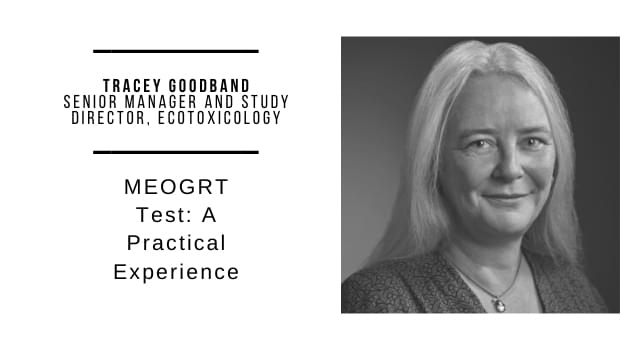View the recording: The Future of High-Tier Amphibian Testing – Navigating Challenges and Exploring Advancements in the Larval Amphibian Growth and Development Assay (LAGDA OECD 241)
Read the LAGDA Q&A
View the recording: Navigating the Challenges of the Medaka Extended One Generation Reproduction Test (MEOGRT OECD 240)
Read the MEOGRT Q&A
Description: The Future of High-Tier Amphibian Testing – Navigating Challenges and Exploring Advancements in the Larval Amphibian Growth and Development Assay (LAGDA)
The Larval Amphibian Growth and Development Assay (LAGDA) is a standard OECD Test Guideline (OECD 241) that assesses the embryonic through juvenile life-stages of frogs to generate data relevant to ecological hazard and risk assessment of chemicals. The test evaluates endpoints indicative of generalized toxicity such as mortality, abnormal behavior, and growth as well as endpoints designed to characterize endocrine toxicity modes of action targeting estrogen, androgen, or thyroid-mediated physiological processes (e.g., histopathology of the thyroid gland, gonad and gonadal duct, abnormal development, and sex ratio).
The LAGDA was validated with the African clawed frog (
Xenopus laevis) and was issued in 2015.
X. laevis has long been the primary amphibian model for assessing endocrine disruptive compounds and is the only validated amphibian species in non-mammalian OECD test guidelines that evaluate thyroid-mediated disruption such as the Amphibian Metamorphosis Assay (AMA) and the
Xenopus Eleutheroembryonic Thyroid Assay (XETA). However, the LAGDA is a substantially longer and more complex assay, and there were a limited number of chemicals tested, and laboratories involved in the test guideline validation.
This webinar provides an overview of the test and discusses technical aspects through experience gained from performing the assay. The applicability of the test, potential new endpoints and their limitations, as well as test design modifications and how they could optimize amphibian testing are discussed.
Watch the webinar:
Speaker: Joseph Marini
Joe Marini, Senior Research Biologist, has been with Smithers for 14 years and is currently a GLP study director for chronic, aquatic toxicology studies including fish full life cycle testing, as well as fish and frog endocrine screening. Between the Tier I, List I EDSP testing and the ongoing ECHA/EFSA initiative, Joe has been the lead in the study conduct of Amphibian Metamorphosis Assays (AMA) and has extensive experience with Xenopus laevis. He also specializes in the design of non-solvent delivery techniques. He received his B.S. degree in Marine Biology from University of Rhode Island and is currently a candidate for his Master of Science in Biology from the University of Massachusetts, Dartmouth.
Webinar Moderator: Michael Bradley
Description: Navigating the Challenges of the Medaka Extended One Generation Reproduction Test (MEOGRT)
The Medaka Extended One Generation Reproduction Test (MEOGRT) is a standard OECD Test Guideline (OECD 240) using multiple generations of fish to generate data relevant to ecological hazard and risk assessment of chemicals. The test evaluates population relevant parameters, such as survival, gross development, growth and reproduction, but also includes endpoints which may provide evidence of endocrine disrupting properties of a chemical such as measuring vitellogenin (Vtg) and evaluating phenotypic secondary sex characteristics (SSC) and histopathology.
The MEOGRT guideline has been designed for use with the Japanese medaka (
Oryzias latipes) and was issued in 2015. The small size, relatively short life cycle, easily identifiable phenotypic secondary sex characteristics and genetic sex determination makes
O. latipes a suitable species for this type of test. However, this species is not routinely used for lower tier fish tests, therefore previous data is often not available and experience with the species can be limited in CROs. This, coupled with the fact that the test is complex with several highly stringent control validity criteria, make the study challenging.
This webinar provides an overview of the test and the practical issues that can be encountered, specifically around the biological control validity criteria. Range-finding test design and test concentration settling are discussed, along with how experience over the years has led to development of refinements and practical modifications for conducting the test.
Watch the webinar:
Speaker: Tracey Goodband
Tracey Goodband, Senior Manager of Ecotoxicology, has over 25 years of experience working as a Study Director in the CRO sector. Tracey is responsible for a wide range of aquatic studies for the agrochemical, pharmaceutical, and industrial chemical markets including higher-tier endocrine testing, with a particular specialism in the OECD 240 (MEOGRT) test. She holds a B.Sc. (Hons) in Applied Biology, specializing in Crop Protection.
Webinar Moderator: David Mitchell
.jpg?ext=.jpg)




-(800-x-600-px)-(644-x-350-px).jpg?ext=.jpg)
.jpg?ext=.jpg)
.jpg?ext=.jpg)
-(1).jpg?ext=.jpg)

-(1).jpg?ext=.jpg)